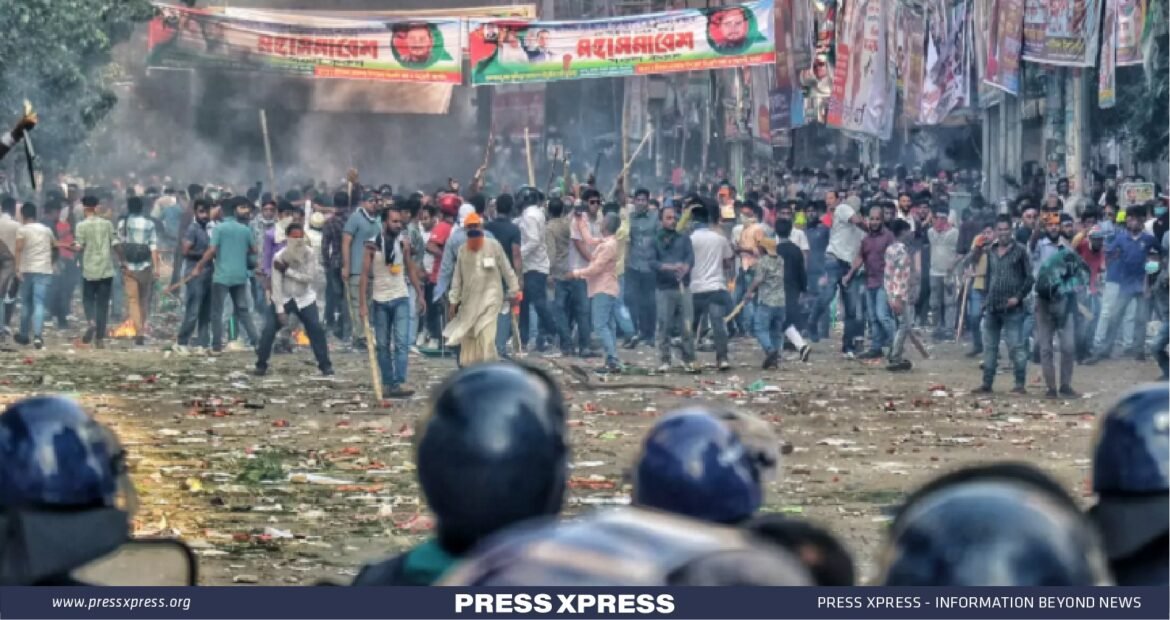In a recent turn of events, the international media has squarely placed the blame on the Bangladesh Nationalist Party (BNP) and Jamaat-e-Islami for the violence that marred the country during and after their joint rally on October 28th, followed by a nationwide hartal on October 29th. These events have raised significant concerns about the state of political affairs in Bangladesh.
Anti-BNP-Jamaat protests took a violent turn, leading to the unfortunate death of a policeman and injuries to several others. These incidents highlight the deep-seated tensions and divisions within Bangladesh’s political sphere. The motives behind these orchestrated acts of violence appear to be tarnishing the image of the current government. This calculated approach aims to erode public trust in the government’s ability to provide stability and security, a tactic employed in the past.
You can also read: Editors’ Council Condemns Attacks on Journalist by BNP Men
The resurgence of the Bangladesh Nationalist Party (BNP) in recent times raises concerns among political analysts about the potential for agitation and political unrest in 2023. This resurgence comes at a critical juncture when the nation is striving for stability and economic growth, emphasizing the importance of closely monitoring these developments.
Once again, the BNP-Jamaat alliance has initiated a nationwide hartal, a move that poses a significant threat to the country’s rapid progress and can cause immense suffering to the general populace. Following their respective grand rallies on Saturday, October 28, 2023, both the BNP and Jamaat-e-Islami announced a nationwide dawn-to-dusk hartal for Sunday, October 29. As the situation unfolds, the world watches with concern, hoping for a peaceful resolution to these political tensions in Bangladesh.
Foreign Involvement Sparks Concerns and Questions
In the midst of ongoing political tensions and attempts to challenge the current government, the Bangladesh Nationalist Party (BNP) appears to be turning its gaze towards the United States for support. Notably, on the evening of October 26, Peter Haas, the United States Ambassador to Bangladesh, along with several foreign diplomats, attended a dinner meeting with a faction of BNP leaders, just two days before the party’s major rally at Naya Paltan in the capital city.
The involvement of US Ambassador Haas in this dinner meeting has garnered significant attention and raised questions about the nature of foreign intervention in Bangladesh’s domestic political affairs. This development became particularly pronounced when the political ally of BNP, Jamaat, announced its intention to hold a separate rally on Saturday at Shapla Chattar.
As the situation unfolds, the role of the United States in this political landscape remains a topic of curiosity. While the BNP seeks support, the US embassy has not issued specific comments regarding the meeting or its implications. This recent interaction between foreign diplomats and a prominent political party highlights the complexity of the political environment in Bangladesh and the various international dynamics at play.
Government’s Commitment to Justice and the Rule of Law
Prime Minister Sheikh Hasina’s recent emphatic call for the swift resolution of trials related to the BNP-Jamaat arson attacks underscores the government’s commitment to upholding justice and the rule of law in Bangladesh. The historical context of political violence and systematic attacks highlights the urgency of ensuring accountability for past atrocities and preventing future incidents. Sheikh Hasina’s dedication to her country’s founding principles of justice and human rights represents essential steps towards a more peaceful and democratic future for Bangladesh.
The dynamics at play in Bangladesh’s political scene are intricate and evolving, with both domestic and international factors contributing to the ongoing developments. The nation’s future course will likely be shaped by how these various elements interact and influence the unfolding narrative.


